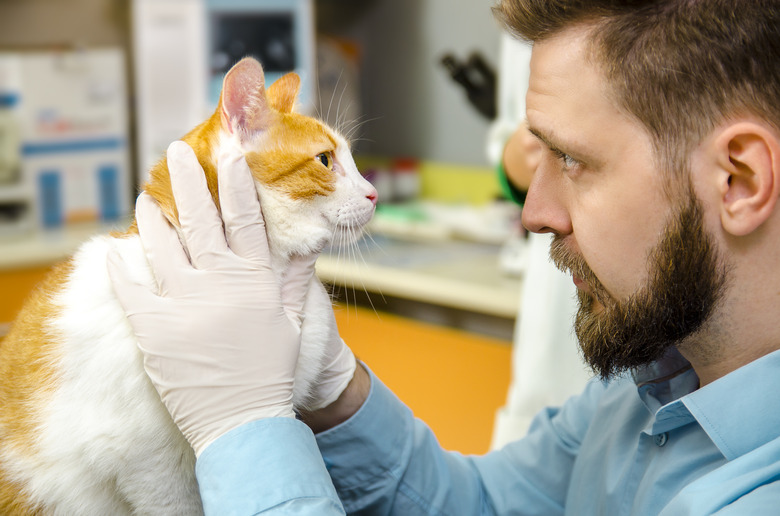Eye With A Green Discharge In A Cat
They say that the eyes are the windows to the soul and that is certainly true for cat eyes. Our expressive little companions seem to tell us a lot with those soulful eyes of theirs, from how much they love us to how much they want dinner. Unfortunately, sometimes those adorable cat eyes can become infected.
Eye infections in cats can lead to everything from mild discharge to pain and even blindness if left untreated. If you've noticed any green discharge coming from your kitty's eye, you'll need to get her to a veterinarian right away for a proper diagnosis because this could indicate a variety of medical conditions.
Dry cat eyes
Dry cat eyes
If your cat has dry eyes, technically referred to as keratoconjunctivitis sicca, each time he blinks, his inner eyelid is scratching against his cornea because there aren't enough tears to keep things lubricated properly. As you can imagine, this is very painful for your cat and can result in greenish or yellow discharge due to the eye becoming infected, according to Vet Street. You might also notice him pawing at his eyes that appear red and irritated. This condition can lead to blindness if not treated by a veterinarian.
Dry eye in cats has several causes, including autoimmune disorders, nerve disorders, certain medications, systemic diseases, and bacterial or viral infections. Your veterinarian can examine your cat and the eye for signs of a feline eye infection and any scratches on the cornea. He will likely prescribe prescription eye drops to treat any infections and cat-specific artificial tears to keep the eyes lubricated.
Cat conjunctivitis and discharge
Cat conjunctivitis and discharge
One of the main causes of green, mucus-like discharge in cat eyes is cat conjunctivitis. Cats with conjunctivitis, commonly known as pink eye, experience redness and irritation in one or both of the eyes. They may also be sensitive to light, according to WebMD.
Conjunctivitis may be caused by a variety of things including a flare-up of feline herpesvirus, allergies, trauma to the eye, an irritant in the environment, or a bacterial feline eye infection like Chlamydia conjunctivitis. Treatment for cat conjunctivitis will depend on its cause, and your vet will determine what is right for your cat.
It is important to get your cat to the vet immediately if you notice that she has symptoms of pink eye and a fever, diarrhea, or breathing issues. These additional symptoms could indicate that she is suffering from feline infectious peritonitis, a disease that can cause inflammation of the cornea and mucus-like discharge from the eyes, according to Vet Info. This condition is likely fatal and could be contagious to other cats.
Feline eye infection
Feline eye infection
A thick, greenish discharge from the eye, rather than clear discharge, indicates an infection of some kind, whether it's bacterial, viral, or fungal. You'll likely notice that in addition to the thick discharge, your cat is pawing at his eye, closing his eyelid, or rubbing his head on things around him. The infection could be due to an eye injury or a secondary condition to an upper respiratory infection. If this is the case, your cat may also be sneezing, sniffling, and have a decreased appetite due to a stuffy nose.
Your veterinarian will determine the cause of the infection and treat it with appropriate eye drops. She will also treat any additional conditions such as an upper respiratory condition.
Cat and kitten eye boogers
Cat and kitten eye boogers
Just like us, all cats do have some natural tearing that can dry up in the corners of the eyes, typically after sleeping, which can lead to cat or kitten eye boogers, according to Catster. If, after clearing away the discharge with a damp cloth or sterile saline solution, you notice that it returns and that the eye is red or inflamed, it's time to head to the vet. Your vet can take a look at the cat or kitten eye boogers to determine if anything is amiss, such as an eye infection or a blocked tear duct.
Don't attempt to treat an eye condition yourself using human eye drops because these drops may not be appropriate for your cat, warns Pet Place. Your vet will treat the cause of the eye irritation and may prescribe feline-specific lubricant or steroid eye drops to help relieve any discomfort for your cat.
As a precaution, don't touch your own eyes after direct contact with your cat if she has any form of eye infection as some types of bacteria, like those that cause Chlamydia conjunctivitis, and viruses can be transmitted to people, warns Cat Health And, always wash your hands after cleaning your cat's eyes or administering medication.
Always check with your veterinarian before changing your pet's diet, medication, or physical activity routines. This information is not a substitute for a vet's opinion.
